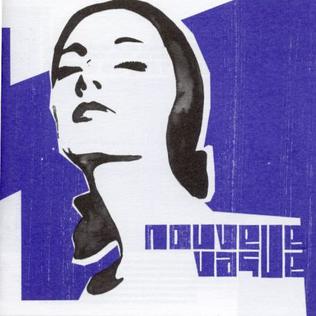No wave was an avant-garde music genre and visual art scene that emerged in the late 1970s in Downtown New York City. The term was a pun based on the rejection of commercial new wave music. Reacting against punk rock's recycling of rock and roll clichés, no wave musicians instead experimented with noise, dissonance, and atonality, as well as non-rock genres like free jazz, funk, and disco. The scene often reflected an abrasive, confrontational, and nihilistic world view.
DNA is a molecule encoding the genetic instructions for life.

Jacques Rozier was a French film director and screenwriter. He was one of the lesser-known members of the French New Wave movement and has collaborated with Jean-Luc Godard. Three of his films have been screened at the Cannes Film Festival. In 1978, he was a member of the jury at the 28th Berlin International Film Festival.

Nouvelle Vague is a French cover band led by musicians Olivier Libaux and Marc Collin. Their name means "new wave" in French, and refers simultaneously to the French New Wave cinema movement of the 1960s, to the new wave music movement of the 1970s and 1980s, which provides many of the songs that the band covers, and to bossa nova, a musical style that the band frequently uses in its arrangements.

Nouvelle Vague is the debut studio album by the French band Nouvelle Vague. It was first released on 9 August 2004 on Peacefrog Records.
Nouvelle is a French word, the feminine form of "new". It may refer to:
The Japanese New Wave is a term for a group of loosely-connected Japanese films and filmmakers between the late 1950s and part of the 1970s. The most prominent representatives include directors Nagisa Ōshima, Yoshishige Yoshida, Masahiro Shinoda and Shōhei Imamura.

Bande à Part is the second studio album by the French band Nouvelle Vague. It was released on 14 June 2006 in Europe on Peacefrog Records. Like the band's eponymous first album, Bande à Part is a collection of bossa nova cover versions of 1980s new wave tracks.
Bande à part may refer to:

3 is the third studio album by the French band Nouvelle Vague. It was released 16 June 2009 on Peacefrog Records. As with their previous releases, the album consists entirely of cover versions of post-punk and new wave songs from the 1970s and 1980s. Four of the tracks are performed as duets, featuring the song's original vocalist performing alongside one of Nouvelle Vague's female singers.
Evgeniya Dmitrievna "Jenia" Lubich is a Russian singer-songwriter who performs and writes in English, Russian, French and Spanish. Her work encompasses recording, song-writing, session performance, live performance, and TV performance.

Olivier Libaux was a French record producer, songwriter, and guitarist. A founding member of the band Les Objets, he was also the founder of the musical projects Nouvelle Vague and Uncovered Queens of the Stone Age.

Marc Collin is a French musician, film music composer and record producer. He is best known as the founder, with Olivier Libaux, of the project Nouvelle Vague, a cover band that covers new wave songs in a bossa nova style. Collin also released a side-project album in 2008 under his own name, titled Hollywood, mon amour, consisting of covers, on the Nouvelle Vague formula, of songs from 1980s film soundtracks. Collin stated that he did not embark on the project out of nostalgia for the films, but because he was drawn to the challenge of transforming extremely well-known hits into intimate tracks.
This page is based on this
Wikipedia article Text is available under the
CC BY-SA 4.0 license; additional terms may apply.
Images, videos and audio are available under their respective licenses.






